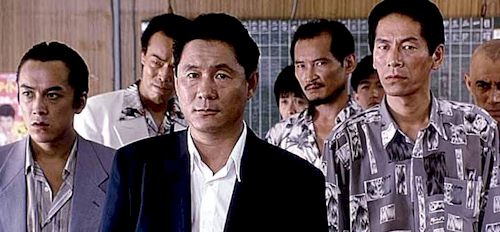|
|
|
|
|
|
|
|
|
|
|
Sonatine |
|
|
| |
|
review | notes | awards | availability | |
|
|
| |

Takeshi Kitano (center) leads the pack in Sonatine. |
|
|
Year: |
1993 |
|
|
|
Director: |
Takeshi
Kitano |
|
|
| |
Producer: |
Kazayoshi Okuyama |
|
| |
Writer: |
Takeshi
Kitano |
|
| |
Cast: |
Takeshi Kitano, Aya Kokumai, Tetsu Watanabe, Masanobu Katsumura,
Susumu Terajima, Ren Osugi, Tonbo Zushi, Kenichi Yajima |
|
| |
The
Skinny: |
Strangely heartwarming tale of a burned out Yakuza sent to
broker peace between two rival gangs. The childlike sense
of humor displayed by writer-director Takeshi Kitano sets
this otherwise by-the-numbers crime drama apart from the pack. |
|
|
Review by
Calvin
McMillin: |
Though it may depict the lives
of Japanese gangsters, Sonatine isn't your typical
Yakuza flick. Sure, the general plot elements are there (extortion,
torture, double-crossing, and murder) but that's not all the
movie's about. The film charts the fading "career"
of veteran mobster Murakawa (Takeshi Kitano), as he is sent
on a mercy mission to restore order to a gang war that has
erupted in Okinawa. Murakawa and his men soon discover that
this assignment was nothing more than a ruse to get rid of
him and muscle in on his turf back in Japan. Ambushed and
abandoned, Murakawa and his cronies end up retreating to a
beach house to await their next move.
It is during these beach scenes
that the film really shifts in tone. The gangster elements
become more subdued as these tough guys—with nothing
but time on their hands—lighten up and enjoy themselves.
With a sense of whimsy virtually unheard of in this genre,
the down-and-out Yakuza play a myriad of childish games. From
sumo wrestling to setting sand traps, from playing Frisbee
to a chilling game of Russian roulette, these boys know how
to have fun. What's most interesting about the humor is that
there's always the potential for violence simmering underneath
the surface. What's more, the image of the Yakuza tough guy
gets tweaked as Sonatine's thugs revert to a sort of
second childhood in an effort to stave off this sense of impending
doom.
Fans of later Kitano films like Kikujiro
and Brother will be pleasantly surprised to find many
familiar plot elements in the earlier Sonatine. Much
like Stephen Chow, Takeshi Kitano seems to enjoy creating
variations on the same theme. Perhaps his greatest achievement
in Sonatine is that he takes these otherwise unscrupulous,
inaccessible, and irredeemable characters and does the impossible:
he makes them charming, lovable, and downright human without
losing a single iota of that tough guy swagger. (Calvin McMillin, 2003) |
|
|
Notes: |
• The Japanese title, Sonachine, is actually a
type of Okinawan folk music, which composer Joe Hisaishi references
in the score.
• At the time of this writing, the American release of
Sonatine is available only on VHS from Quentin Tarantino's
Rolling Thunder imprint. Other releases from Tarantino's lineup
(Chungking Express, Switchblade Sisters, and
Mighty Peking Man) have been released in the DVD format,
so a DVD version of Beat Takeshi's hit film seems inevitable. |
|
|
Awards: |
1994 Awards of the Japanese Academy
• Best Film Score (Jo Hisaishi)
1995 Cognac Festival du Film Policier
• Critics Award (Takeshi Kitano) |
|
|
Availability: |
DVD (Hong Kong)
Region 3 NTSC
Panorama Entertainment
Widescreen
Dolby Digital 5.1
Japanese Language Track
Removable English and Chinese subtitles
Audio Commentary, Trailer, Filmographies |
|
|
|
DVD (UK)
Region 2 PAL
Tartan
Widescreen
Dolby Digital 5.1
Japanese Language Track
Removable English subtitles
Trailer, Filmographies, Photo Gallery
|
|
|
|
 |
|
|
|
|
|
|
|
|
|
|
|
|
|
|
|
|
|
|
|
| LoveHKFilm.com
Copyright ©2002-2017 Ross Chen
|
|
|